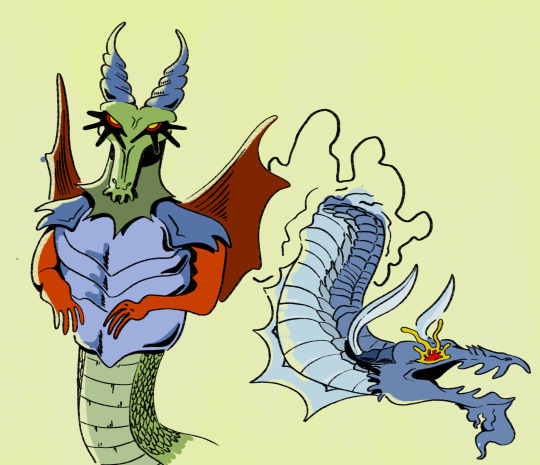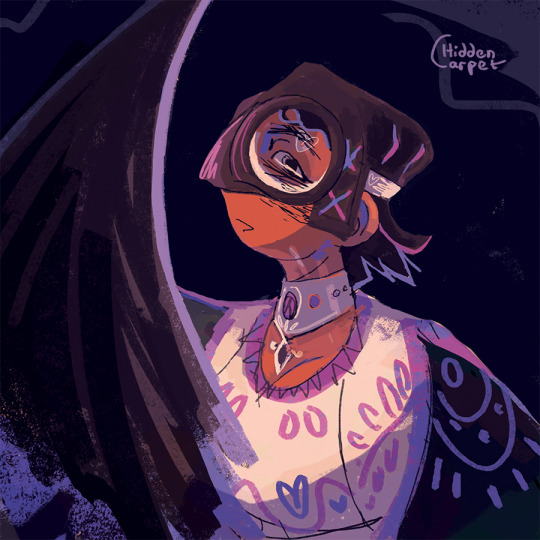#miscellaneous creatures
Explore tagged Tumblr posts
Text

Wild Waves by Himmis on DeviantArt
23 notes
·
View notes
Text
Song of the Night by Ksenia Kholom'yeva
荆棘公主 (The Thorn Princess) by xia chenjie
could not find the third one.



unknown artists
86 notes
·
View notes
Text
The Getulian Dog [miscellaneous]

In the mid-17th century, Edward Topsell published a treatise on the animal kingdom in which he described many creatures: both real animals and some fictional beings that got mixed up in his research. And some whose existence is not entirely clear: one of these is the Getulian dog, also called the ‘mimick dog’, a curious canine breed with a remarkable talent for imitating everything it sees.
He classified this dog as Canis lucernarius (which, in modern biological terminology, would make it a species closely related to wolves and not a breed of dog). They have a black head resembling that of a hedgehog and the intelligence of an ape. Their legs are particularly long and support a somewhat short, curved body with a short tail and shaggy fur. Curiously, at least some of these dogs were supposedly raised by apes.
The name ‘Getulian dog’ would imply that these animals hailed from Getulia in northern Africa, but it's unclear whether these stories are fiction or just exaggerated tales of a real dog breed. In the 3rd century B.C., these animals were popular in Egypt, where people trained them to perform tricks. They were so smart that people who could not afford human servants would often train Getulian dogs to perform household tasks.
As they are highly intelligent, these dogs have supposedly been used in theatre and plays since ancient times. According to the ancient historian Plutarchus, one of these trained dogs performed in a public spectacle attended by the emperor Vespasianus (so in the first century A.D.). In the play, a character murdered the dog by feeding him a piece of poisoned bread, and the dog perfectly played the part by pretending to stumble down and die. After this scene the dog stood back up, alive and unharmed, to the joy and amazement of the audience.
As a closing statement, I like this story because most of the myths and tales I read are about man-eating monsters and vengeful deities. But this story is just ‘this one dog was trained for a theatre play and he was really good at it!’
Source: Topsell, E., 1658, the History of Four-footed Beasts, Serpents, and Insects. Describing at large their true and lively figure, their several names, conditions, kinds, virtues (both Natural and Medicinal), countries of their breed, their love and hatred to mankind, and the wonderful work of God in their creation, preservation and destruction., printed by E. Cotes, London, p.127-128, 1098 pp. (image source: Edward Topsell, History of Four-footed beasts, 1658)
69 notes
·
View notes
Text

beasts (miscellaneous)
#art#artists on tumblr#crayon#pen#creature#beast#yeah idk how to tag these things#theyre beasts miscellaneous and thats. like the only way i can describe them#anywho whats up w 'turn shape into thing' art challenges they have such a good rate of getting me out of art block#these are made by scribbling w a pen then turning the scribble into A Beast. then colouring w a crayon
25 notes
·
View notes
Text
In a broad sense they could be considered "of Faërie", that is, considering that to mean the whole conceptual area of of myth-magic writ large; the meaning of "faerie" that refers to just about anything enchanted, rather than to a specific realm or "dimension" and its denizens. Usually though they would be considered "mythical creatures" and not fae per se.
Are heraldic beasts considered fae?... Totally asking for a friend haha.
3 notes
·
View notes
Note
I now adore your design of Brud. He is my child now, and there is nothing you can do to stop me./j
<3
IM GIGGLING can't argue with that hehe, he happi hyee :33

#leer got an ask#miscellaneous leer#drew a small doodle as a lil bonus bc i love this silly ice cream creature hyeee :33#wheheeheheee hyeeeee brud happ :33#your-local-bunni
15 notes
·
View notes
Text
my Creatures. my Beloved Creatures. I’m not good at watercolor but I wanted to paint my Beloved Creatures


^ this (poorly drawn) fella right here is a jerbomb! I Very briefly mentioned them during a long tag ramble so I’ll go over them again in more detail bc I adore them. Appearance-wise, they’re basically just jerboas, but they’re functional land mines. Predictably, they’re not naturally occurring—they’re genetically engineered jerboas that were (originally) used as weapons. Also as you can see they don’t have arms, just particularly strong legs (longer than a normal jerboa’s) and claws that they use to burrow. Lacking mouths, they get their nutrients through sniffing stuff up through their big ol’ noses and absorbing the nutrients through their respiratory system. Does that make biological sense, no. but they’re exploding rodents so idk suspend your disbelief just a little. They’re a lot more fuzzy than what’s shown here but I liked the muted pink and yellow color scheme and didn’t want to cover it up with a bunch of fur so idk this can be a hairless jerbomb. Heartbreakingly their population is scarce because their very existence was essentially for them to be suicide bombers but DONT WORRY before too many of them died off, sushi rescued and domesticated them so they’re living their best life!!! even though they’ll eventually go extinct as they can’t breed!!
#I LOVE making creatures aoouughhhh it’s so fun#these are but a few of my Creatures…….#I can’t name them off the top of my head but there are also#unnamed smoke creatures. dinkies. closet friends. green-assed-finches. potato butterflies. lemon beetles. tigers (theyre not normal tigers)#little sentient granola bars. numerous skeletons and ghosts and the like. pums. definitely more I’m not remembering#lots of miscellaneous hybrids. not all of them are humanoid (though cases like those are mostly mistakes)#and of course. sighs dreamily. my beloved Meteor Picasso#pdbc#art#uhhh I dunnohmmm.#traditional art#watercolor#I always feel odd using broader tags like that cause there’s a higher chance I’ll be Observed#I dreamt last night that one of my pdbc posts got an influx of attention and I was So scared. worst dream of all time#I want people to see my posts but simultaneously the second I get 20+ notes I’m cowering in fear
7 notes
·
View notes
Text

devious wyrms
#creature art#fantasy#dragon#dragon art#wyrms#some of my sketches i finished digitally#trying new stuff#miscellaneous stuff
35 notes
·
View notes
Text
8 notes
·
View notes
Text

Day 56. now draw her as a white eared possum
bonus:

me when an androgynous blonde guy tells me to do anything.
#art.jpeg#oxitocina#undescribed#sheilaposting#sheila e.#phf#jjba#i like drawing her as miscellaneous animals. my creature.#she even has little gloves already she was made for this role...#<- sorry my fursona is a possum so u can imagine the type of love i hold for these things..
6 notes
·
View notes
Text

Welcome to Miscellandia, the land of all miscellaneous things! 🌳🌼🐛
Henri and Caroline are exploring the forest and gathering data about every kind of species they find. They're building a digital encyclopedia that will be available to other villagers through their own kind of wireless data sharing!
---
I'm reposting this on here after I deleted the post some weeks ago :'0 I noticed that you guys on here like my creatures and animals art, so here's more of it! :D
#miscellandia#miscellaneous#creatures#critters#fantasy#artists on tumblr#illustration#drawing#children illustration#mixed media#original character#my oc stuff#my art#my oc art
8 notes
·
View notes
Text


went a little different this time and I drew some mutuals' OCs (namely @cyzebra26 's kelpies and my boyfriend's Virion) interacting with some of mine :D
#warrior of miscellane#art#artwork#illustration#ocs#original characters#my art#original art#digital art#pixel art#fantasy#fantasy ocs#fantasy art#dragon oc#kelpie oc#elf oc#crystal oc#mythical creatures#colorful art#cartoon art
11 notes
·
View notes
Text
Python, or the alchemical Mercurius

This is an unusual entry, even among the strange monsters and spirits that I usually write about.
In the 16th century, Giovanni Battista Nazari wrote the alchemical work ‘Il Metamorfosi metallico et humano’. In this book, the wandering protagonist travels through three dreams that teach him about alchemy, nature, and the transformation of the human being into the divine, and these subjects are brought to the reader in the form of allegories, some of them more cryptic than others.
In the third dream, the protagonist encounters a blessed damsel who shows him a wondrous device to watch the stars and the course of the sun through the constellations. Then she shows him a horrible, frightening monster, a winged and venomous beast that would have terrified the bravest men. The damsel manages to flatter the creature and it calms down. Then, it speaks to the protagonist and claims to be the hen, and the horrible ferocious dragon which has endured throughout time. It died once, but then revived itself and killed death.
The creature then describes itself with a series of riddles, such as “My parents have conceived me, but I had conceived them first. I am both father and son.’ and ‘If I bite someone, they will be bitten by death itself in the head, unless they bite me first. But to bite me, they must first bite themselves’.

So what does this creature represent? The key here is the three strange heads of the dragon: they represent the ‘tria prima’ which are three central elements of alchemical transmutation according to Paracelsus: mercury, salt and sulphur. Note that this does not refer to the literal, physical materials, but rather to their sophic counterparts, meaning the energy of the alchemical elements. These elements are further associated with certain celestial bodies and concepts, which are depicted in the different parts of the dragon’s weird body. And the bearded face might reference the ‘prima materia’, the fundamental source of these elements.
This creature reappeared in the ‘Alchemical and Rosicrucian Compendium’ written by an unknown author around 1760. It appears the allegorical creature was referred to as ‘Python’ in this book, perhaps in reference to the dragon from Greek mythology. I think it is also called ‘Mercurius’ here, but this could be a misunderstanding on my part. In my defense, the handwriting makes it really difficult to translate.
Nevertheless, the creature reappears in a handful of other alchemical works, as an allegory to Paracelcus’ tria prima.
Sources:
Nazari Giovanni Battista, 1564, Il Metamorfosi metallico et humano.
Unknown author, ca. 1760, Alchemical and Rosicrucian Compendium, which you can read here in the Yale University’s collection.
Greenberg, A., 2007, From Alchemy to Chemistry in Picture and Story, John Wiley & Sons, 688 pp., p. 81.
(image 1: ‘The Philosophers’ by Christopher Ulrich, a homage to Gustave Courbet’s 1854 painting ‘Bonjour Monsieur Courbet’)
(image source 2: Alchemical and Rosicrucian Compendium, 1760?)
#Dragons#Miscellaneous#Alchemy#mythical creatures#Monsters#Creatures#I had to delve through some really obscure and esoteric alchemy manuals for this one#There is also some symbolism with celestial bodies
31 notes
·
View notes
Note
*nia and imre: 👁👄👁
can't believe i fucked an ask the fuck??
Oh I fuck up everything so it’s fine 😌
14 notes
·
View notes
Text

Having fun with a bit of some thin lines :)
#it's nice to change from thick to thin every now and then#original art#artists on tumblr#miscellaneous#carpet's art#id in alt#described art#fantasy#siren#fantasy siren#harpy#harpy oc#mythical creatures#fantasy creatures#hiddencarpet#hidden carpet#2024#march#dnd#dnd art#fantasy art
13 notes
·
View notes
Text


currently one of my favourite ocs....nero huntington, born connor karkinnen, who is like 7 feet tall and is afraid that he'll accidentally step on people or small animals
#scopophobia tw#nero huntington#ocs#커뮤#miscellaneous#i realized with designing this character that i love dressing my ocs in like....regular clothes#but layered so that it's not too boring?#also he has a tiny little manta ray creature friend named pancake and she measures 3" across#his hands are the size of printer paper because he's 210cm tall
12 notes
·
View notes